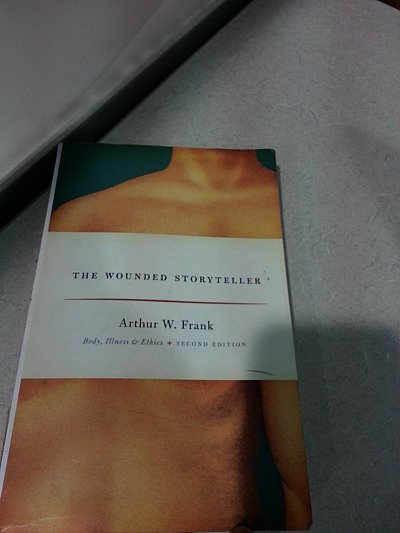- Home
- Think Pieces
- Literary Analysis
- Wounded Storyteller Arthur Frank
The Wounded Storyteller by Arthur Frank ~ Main ideas
Let's look at main ideas from the book, "The Wounded Storyteller" by Arthur Frank. This book examines the concept of human illness, our experiences as sick people, and the way we interact with the world around us.

Who is the wounded storyteller? According to Arthur Frank, the wounded storyteller is anyone who has suffered and lived to tell the tale. Technically, that is everyone at some point.
Arthur Frank was moved to write the Wounded Storyteller as a result of his own experiences with disease. For him, writing the book was part of the process of self-healing. He found sharing the illness experiences of others as a way to connect with those who might understand his own suffering.
Taking Your Health into Your Own Hands
In the book, Frank discusses three related subjects: the post-modern experience of illness, medical colonization, and post-colonialism.
To understand the post-modern experience of illness, we must first understand what can be described as the modern experience of illness. Frank explains that the modern experience of illness is when the medical word takes control over an ill person. The physician uses his technical expertise to "interpret [the patient's] pain as symptoms" and provides a diagnosis.
Frank believes that the modern experience of illness is overwhelming to the patient, too formal and prevents the patient from really knowing what is going on as they are not allowed nor able to read the medical charts on which their illness is documented. The patient then goes on to tell others about their illness in the same way the physician interpreted it.
One the other hand, the post-modern experience of illness is when "the capacity for telling one's own story is reclaimed". In order words, a patient with the post-modern experience is able to tell their own story, in their own words by reflecting on their body and self.
Medical colonization is when medicine "claims the body of its patient as its territory, at least for the duration of the treatment". Dan Gottlieb describes medical colonization as when "we stop being people and start being patients". Medical colonization also reduces the suffering of its patients to a "unifying view", meaning that it lumps all patients together, not seeing them as individual bodies and voices.
Post-colonialism is the idea of people breaking free from medical colonization and having the ability to speak for themselves and have their own voice in regards to their illness.
The post-modern responsibility is to be able to listen to and understand the illness experiences of others, it involves "being for the other, bearing responsibility for the other".
Remission Society
Frank also talks about a "remission society" made up of people who are "well but could never be considered cured" because their illness still affects their everyday lives in some way. Examples of those in the remission society involve those who have had cancer, the disabled, the chronically ill and those whose allergies and environmental sensitivities require dietary and other self-monitoring.
According to Frank, those in the remission society constantly shift between sickness and wellness. Their life is never the same after their illness. Susan Sontag created a metaphor of illness, saying that there are two kingdoms: the kingdom of the well and the kingdom of the sick. For a person in the remission society, it is like they are on permanent visa status as they are caught between the two kingdoms.

Four Body Problems
Frank also talks about four body problems:
The problem of control.
People want to be able to control their bodies. When people are able to control their bodies, things flow easily and become predictable. However, "disease itself is a loss of predictability". Illness can lead to incontinence, loss of memory, shortness of breath and other "failures of the sick body".
An ill body can experience contingency, which is the opposite of having control over oneself.
Loss of control can be stigmatizing. It can also be very embarrassing, both for the person who experiences contingency and for spectators. Often, the ill person may try to avoid this by not being in situations where he might embarrass himself. The illness person may also try to protect others from witnessing such displays of contingency.
Body-relatedness.
Body-relatedness refers to a person's answer to the question, "Do I have a body or am I a body?". People can be dissociated or associated to their bodies.
Patients who are dissociated see their body as an "it". Such a patient ignores their body's needs and does not eat well or exercise.
On the other hand, patients who are associated see themselves as 'being' a body rather than just having one. Such patients take care of their body.
Other-relatedness.
Other-relatedness is about a persons's relationship to other people, in terms of being a body.
A dyadic body has a sense of brotherhood and feels a connection to other bodies. The dyadic body sees suffering as shared and receives assurance through storytelling and knowing that other bodies can recognise what it feels.
A monadic body sees itself as separate and alone. Frank argues that medicine encourages monadic bodies as hospitals create distance and prevent contact between patients and the world around them.
Desire.
The fourth body problem is desire. Desire is the problem of always wanting more. Ill bodies can to come to lack desire and as a result, they may not take extra care to show love to themselves.
A body lacking desire would not likely be interested in buying new shoes, or wearing makeup. Such a body might "fall out of love with itself" and result in the diminished self. The diminished self is when a body ceases to consider itself desirable.
Some bodies remain productive of desire. For instance, a dyadic body will still love itself and feel the desire to serve others.
Four Typical Bodies
Frank also talks about four typical bodies:
The Disciplined Body.
The discipline body takes action to self-regiment. It tries to assert predictability through therapeutic regimens like medical treatments. The disciplined body is disassociated and monadic, its only goal is to get well.
The Mirroring Body.
The mirroring body "defines itself in acts of consumption". The mirroring body seeks to enhance, groom and feed itself. The mirroring body compares itself to and tries to imitate more stylish and healthier bodies. The mirroring body is very visual, it "sees an image, idealizes it, and seeks to become the image of that image. The mirroring body is monadic and compulsively associated with itself.
The Dominating Body.
The dominating body "assumes the contingency of disease but never accepts it". The dominating body is forceful and turns against others, yet it is described as being dyadic. The dominating body is disassociated from itself and often abusive to others.
The Communicative Body
The communicative body accepts contingency as a part of life. It is an ideal body type that provides an ethical ideal for bodies. The communicative body is fully associated with itself and is dyadic. The communicative body lives for others and wants to relieve them of their suffering.
Narratives: Restitution, Chaos and Quest
The final key aspect we will consider are three types of narratives Arthur Frank identifies: the restitution narrative, the chaos narrative and the quest narrative.
Restitution.
The restitution narrative is the most preferred narrative. It follows the basic story line of, "Yesterday I was healthy, today I am sick, tomorrow I will be healthy again". The restitution narrative reflects a natural desire to get well and stay well and it is linked to the phrase "good as new". According to Frank, the medical world strives for the restitution narrative but this crowds out other narratives because it denies mortality.
Chaos.
The chaos narrative is an "anti-narrative of time without sequence", it involves a patient who speaks without the ability to reflect on their experience. A body in the chaos narrative feels imprisoned in the needs of the moment and speaks with hesitation and stuttering. The chaos narrative is the hardest to hear because it is too threatening.
Quest
The quest narrative is defined by the patient's belief that something is to be gained by their experience. Quest narratives meet suffering head on, they accept illness and seek to use it. Most published stories are quest narratives. There are three facets of quest narratives:
Memoir - The memoir is the gentlest style of quest narrative. It combines telling the illness story with telling other events in the writer's life. No special insight is claimed at the end.
Manifesto - The least gentle quest narratives are manifestos. Manifesto narratives carry demands for social action. They often involve a situation where society is suppressing a truth about illness and the narrative seeks to let that truth be told. Manifestos are prophetic and political.
Automythology - The automythology narrative is based around the metaphor of the Phoenix, which reinvents itself from the ashes of the fire of its own body. The author of an automythology narrative has not only survived, but also been reborn. In this narrative, individual change is emphasized.
That is a summary of the key points from "The Wounded Storyteller" by Arthur Frank. It was an interesting book to study, and it brought out several fascinating concepts. What points did you find most interesting? Do you agree with Arthur Frank? Feel free to comment below.
For You...
Thanks for reading! If you liked this content, share with a friend:
Recent Articles
-
5 Subtle Habits That Quietly Transform Your Life Over Time
Jan 25, 26 08:21 PM
Progress towards the things that matter isn't usually loud or dramatic. Here are 5 subtle habits that quietly transform your life over time. -
Inner Work with Marcus Lynn | How to Make Change More Realistic
Jan 19, 26 06:24 PM
In this spotlight interview, therapist Marcus Lynn explains how we can begin to see emotions as information and make change more realistic in our lives. -
7 Best Personal Development Courses to Grow Your Skills and Mindset
Jan 01, 26 11:04 PM
To reach your goals for the year, there are are certain skills you might need to unlock first. Here are the best personal development courses to level up your life in 2026.













New! Comments
Have your say about what you just read! Leave me a comment in the box below.